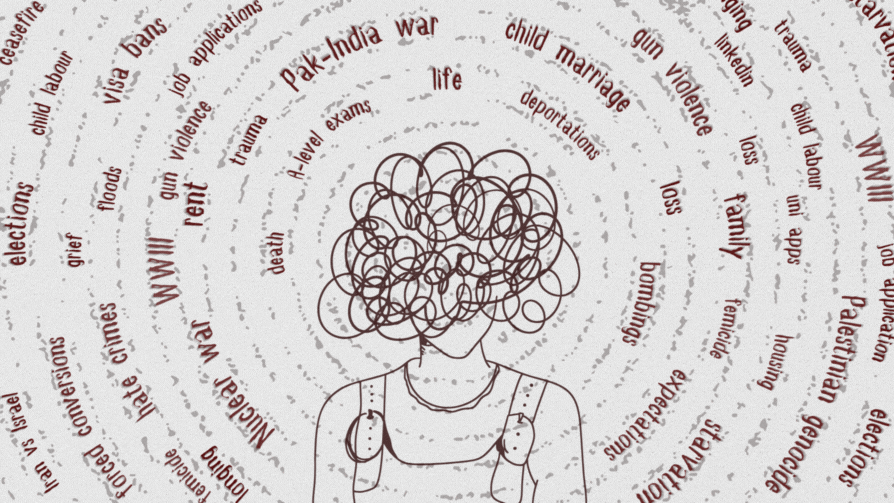Adnan Siddiqui's production debut Dum Mastam is all dressed up but has nowhere to go
Adnan Siddiqui ambles through the winding streets of androon shehr [inner city] Lahore on a cold December night in 2019. His phone’s video camera swivels to show glimpses of the musty, romantic nooks that epitomise the area, zeroing in on jalebis getting friend, steam curling off them and wafting out into the winter air, fairy lights lit up outside food kiosks or on the little boys who have excitedly gathered around him.
“Are you ready to watch Dum Mastam?” he asks them. The actor is turning film producer and his debut cinematic production is being shot in these alleys. He is excited, adeptly building up hype through his social media fan following.
As he roams through different parts of the country while shooting, Adnan’s excitement is palpable, even when observed from a social media vantage point. “Zor say bolo Dum Mastam [Say Dum Mastam loudly],” he tells a grinning crowd of schoolboys from Azad Kashmir.
The cast and crew — director Mohammad Ehteshamuddin, the two lead actors Imran Ashraf Awan and Amar Khan, and a motley crew of gaffers, grips and spot boys — were probably occupied with filming, but producer sahib had carte blanche to give his input and then explore the locales.
Dum Mastam, Adnan Siddiqui’s debut as film producer, is ready to release and is apparently a rom-com that’s high on entertainment. What we don’t have are cinemas where it can release
The shooting was on a roll. As Ehtesham explained to me recently, “All filmmakers believe that a movie should be shot quickly and then released promptly. That way, it doesn’t get outdated.” But it was not to be. From Lahore to Karachi, to a song that was shot all across Pakistan, Dum Mastam had only about four days of shooting left in March last year when the Covid-19 nightmare halted life. The last few bits were then shot in October. Most of the dubbing was also completed later.
Dum Mastam was ready but cinemas, of course, were not. “This is my first movie production and I’m not going to take any risks,” Adnan Siddiqui told me time and again, willing to wait until cinemas are operating full-throttle again and, then, probably decide on an Eid release date.
Some months later, at the Hum Style Awards held two weeks ago, Dum Mastam’s poster was finally released. The two leads, as well as Adnan and Ehtesham, acted out a little skit on stage before it was announced that the movie was going to be released in collaboration with Hum Films. A release date was still not announced because, with Covid-19 on the loose, the fate of cinema continues to hang in the balance.

In this one-and-a-half year, though, Dum Mastam’s credentials have gathered strength. I recall when Adnan Siddiqui had first talked to me about his maiden production. He was placing his faith in Amar Khan, a fledgling actress who had written the script and was also playing the female lead. He was also banking on Imran Ashraf Awan, an actor who was yet to take on cinema, although he had just proven his mettle on television by enacting a mentally disabled character, Bhola.
The movie’s soundtrack had been composed by multiple music directors, including some renowned ones, as well as Bilal Saeed, a young musician who Adnan described then as being very talented and immensely popular internationally, but who was yet to become an ‘it’ face in the local musical circuit.
We’re both Pakistani TV’s favourite bahus [daughters-in-law] right now,” Imran and Amar joke to me, referring to the local audience’s unrelenting love for the long-suffering, do-gooder TV hero and heroine. The ensemble cast includes Saife Hasan, Uzma Beg, Adnan Shah Tipu, Saleem Mairaj and Momin Saqib.
Now, though, these very names have a high wattage impact. Bilal Saeed has churned out multiple hits and his fan following has quadrupled. Imran Ashraf has gone on to play hero in successive TV dramas, becoming one of the country’s top-most TV stars. Amar Khan has starred in one of the top-rated dramas of the year, 7th Sky Entertainment’s Qayamat.
“We’re both Pakistani TV’s favourite bahus [daughters-in-law] right now,” Imran and Amar joke to me, referring to the local audience’s unrelenting love for the long-suffering, do-gooder TV hero and heroine. The ensemble cast includes Saife Hasan, Uzma Beg, Adnan Shah Tipu, Saleem Mairaj and Momin Saqib.
Spirits are high amidst the Dum Mastam team when I meet them: producers Adnan Siddiqui and Akhtar Hasnain, director Ehteshamuddin and actors Imran Ashraf and Amar Khan. It’s a rainy day in Karachi and cups of tea are followed by a chatty lunch at Adnan’s home. They have a major channel on board. The poster hints at a rich kaleidoscope of colour, music and romance. And yes, they don’t know when their movie is releasing but they strongly believe that it’s a great movie.
Adnan points out the placatory truth that has prevented filmmakers from nervous breakdowns all through the coronavirus reign: “Film industries around the world are suffering. We’re not the only ones.”
Record-breakers

“We haven’t made this movie to break records, we’ve made it to change records,” Ehtesham says philosophically. “And after Dum Mastam, I believe that box office records in the Pakistani film industry are going to change.”
Ehtesham’s last directorial project had been the Mahira Khan-Bilal Ashraf starrer Superstar. Did the experience help him gain a better know-how of what clicks with the local box office? “You can never be sure about what will work at the box office,” he says, “but, of course, even while making [TV] dramas, we gain a knack for knowing which scenes will be hits, and what parts need to be edited out.
“When I was making Superstar, Azaan Sami Khan, who had written the script, narrated the story to me,” recalls Ehtesham. “I saw this conviction in his eyes. The movie was his dream, which is why I knew that I had to make it. I saw the same dream in Amar’s eyes when she told me Dum Mastam’s story. Basically, all I’m doing is making people’s dreams come true.”
The story, steeped in the romanticism of old Lahore before journeying on to busy urban centres, is one that is close to Amar’s heart. “My grandmother’s home was in androon Lahore and since my mother’s acting career kept her busy, I spent a lot of my childhood there.
“Those neighbourhoods and streets equate with Punjab in my mind, rather than the sprawling fields that are often equated with Punjab in the movies. There are so many mannerisms, festivals and music that is unique to the old mohalla. I was reading out the story to Ehtesham bhai and, at that point, I hadn’t considered that I may be playing the female lead. But he liked the way I spoke some of the dialogues, with a Punjabi tinge, and how I understood the characters. Suddenly, I was on board the cast.
“I was a bit scared. Ehtesham bhai has worked with Mahira Khan and now he’s directing Amar Khan,” she laughs. “But I think it’s worked out.”
Dum Mastam was ready but cinemas, of course, were not. “This is my first movie production and I’m not going to take any risks,” Adnan Siddiqui told me time and again, willing to wait until cinemas are operating full-throttle again and, then, probably decide on an Eid release date.
The unassuming hero
On the other hand, multiple actors were considered for the male lead before Imran Ashraf signed on. “Every producer and director initially considers the names of well-established film stars,” reasons Adnan, “but it was only later that we realised that the actor who would be perfect for the role was close by.”
“When I heard the story and imagined what the hero would be like, I knew that Imran would be the perfect fit,” smiles Ehtesham.
For Imran, the role was a coup de grace of sorts — from playing a bit part in a drama directed by Ehteshamuddin, 2014’s Sadqay Tumhare, he was now the director’s hero. “I still remember my lines from Sadqay Tumhare,” Imran exclaims. And then he says them out, his dialect changing, his expression transforming into that of the villager that he had played all those many years ago.
“They called me in, telling me that I had scenes with Mahira Khan and that I was going to work with Ehtesham bhai. I remember waiting till evening for my scenes to be shot. Then, I came up to Ehtesham bhai and asked him when we would shoot. He looked at me and asked me if I had acted before, and I recounted my dramas that were on air at that time.
“When I said out my lines, the cameraman jumped down from his seat and clutched my hand and asked me, ‘Where were you all this time’?” Imran chortles. “My confidence multiplied after that, and my little role in Sadqay… did get noticed. After that, I almost played a character in Superstar but it didn’t work out. Perhaps it was because I was destined to play Ehtesham bhai’s hero!”
When Adnan and Ehtesham signed on Imran, did they think that he was an unconventional choice for a hero, given that his claim to fame at the time was the mentally impaired Bhola? “What is conventional anyway?” queries Adnan. “Imran is very well-loved and he’s a great actor. I think that he can transform into any role given to him.”
“I was very happy…,” says Ehtesham.
“… I heard that he ordered refreshments in celebration when I was signed on!” Imran interjects. “On a more serious note, when I was offered the role, I told Ehtesham bhai that I had a rod implanted in my foot, and may find it difficult to dance. Instead of considering it an obstacle, Ehtesham bhai took it on as a challenge.”
“He danced so well, you’ll see,” Ehtesham adds.
Gritty stories from the other side

A cinematic production is always a labour of love and, from Imran overcoming his foot injury to the long shooting sessions, the cast and crew have many stories to share. In Amar’s case, acting in Dum Mastam has turned out to be a bittersweet victory.
“During most of the movie’s first spell, my naani [maternal grandmother] was ill. She was hospitalised and, every day, I would spend a few hours with her in the morning before going for the shoot and then, at night, I would return to the hospital for two hours. Three days after the completion of the first spell, she passed away. I had wanted something so badly for the past five years and, now that I had got it, I had lost someone I loved so deeply.”
She continues, “There are many more happier memories that I associate with Dum Mastam. I have always loved dancing and I even trained in the Bharatanatyam form when I visited India for a convention back when I was a film student. I have enjoyed the dances in Dum Mastam. And there is this one song where I have to perform an aerial act. For literally four to five hours, I was suspended up in air and I was petrified. Later, I had all these rashes and scratches. Let’s hope the effort pays off and the song looks great!”
The director promises that the movie does look pretty great. “When you walk out from the cinema after watching a movie, you either remember a particular scene or a song. This movie has some great dialogues and the songs are great. Multiple music directors have composed the music; Naveed Naushad, Shiraz Uppal, Azaan Sami Khan, Bilal Saeed and Shani Arshad. We have some very interesting cameos. And we have a rom-com that’s high on entertainment.”
What we don’t have, unfortunately, are cinemas where Dum Mastam, and the many other cinematic releases waiting on the sidelines, can be seen. Do they all think that it’s too early for a curtain-raiser — revealing little glimpses of Dum Mastam — when it will, in all probability given the Covid-19 situation, release next year rather than anytime soon?
“At this point in time, the game is set but we don’t know what move to make,” Ehtesham says. “We’re just bluffing our way through.”
This is, of course, a mild euphemism that doesn’t quite betray the pressure that Pakistani filmmakers are now feeling, with cinemas barely managing to open because of the successive assaults of the coronavirus pandemic. For producers making their debut — Adnan and Akhtar in the case of Dum Mastam — the waiting game must be particularly harrowing.
“Things will get better,” says Adnan. “This can be one curtain-raiser but, little by little, there will be much more to reveal about the movie.”
They’ve rolled the dice. They’re bluffing through right now. But they are optimistic. And it seems they’ve got quite a few aces up their sleeves.
Originally published in Dawn, ICON, July 25th, 2021













Comments